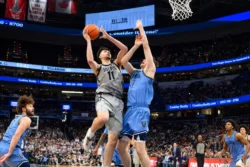Despite Vladmir Putin’s admonitions, encouraging American children to excel is neither dangerous, nor will it be the ruin of future generations, as Amanda Ripley argues in her “Case Against High-School Sports,” published on The Atlantic’s website last week. Instead, it is this insatiable vie to become exceptional that best contrasts American youth from their foreign counterparts. The institutionalized weight of high school sports in American society, I would argue, is a major molding factor that challenges younger generations of Americans to be competitive and not to settle for anything but the top.
Ripley argues that if we changed our schools’ focus to academics, we could climb the worldwide ranks and regain our blue ribbons from bookworms such as Finland and South Korea. Since America never topped any of these lists, the book-smart rankings shouldn’t matter in our street-smart world. While we may have ranked 25th in subjects like math and science, we’re still able to produce geniuses like Steve Jobs who, incidentally, swam for his high school team. That’s the beauty of sports’ integration into the academic education system: Students can excel on more than one platform. High school sports programs allow for creative competition, where there is not just one right answer to an algebra equation, nor a correct translation of Pablo Neruda.
Educational systems, like those of Finland and South Korea, limit themselves by abstaining from the sports culture. By keeping sports intact in the American public education system, we assure access to opportunity for all kids, regardless of socio-economic status. Howard Shultz, the chairman and CEO of Starbucks, found refuge in high school sports. 2Chainz was able to win an athletic scholarship to go to college and become the first member of his family to graduate. If poverty to pumpkin spice lattes isn’t the American dream, then I don’t know what is.
Despite being ludicrous for the aforementioned reasons, Ripley’s fantasy of transferring American obsession with sports to academics is delusional. Over 7.7 million students participated in high school sports last year, and the number is only rising. Non-compulsory in nature, the attraction of high school sports is undeniable. Students reap new friends, an hour or two of fun each day, and a line or two for college applications, as well as a slew of “grown-up” traits which parents couldn’t be happier with. Moreover, by keeping sports within the educational system, we preserve millions more opportunities to excel.
Competitive colleges, such as this one, do not judge applicants based on transcripts or SAT scores alone. We are able to choose hundreds of different paths during our youth, many of which are centered around exercise and play. The diverse, competitive culture that is endorsed by high school athletics creates students like me and you. Without sports opportunities, I wouldn’t have stood out in a crowd of some 20,000 applications, but with organized school sports like cross-country and basketball, I was able to make it among the ranks of you all.
For people like me, high school sports are non-negotiable. Hell, my senior year, we had students transfer from schools with lesser basketball programs that were hours away, just to compete on a higher level. This competitive nature—to be the best and settle for nothing less—is ingrained in the sports culture of the American education system, and rightfully so. The lessons of competition, perseverance, and community inform our society as a whole, and without the framework from an instructional institution, we cannot assure that future generations will have a leg up to the rest of the competition outside our borders.
As the adage goes, close only counts in horseshoes and hand grenades. Sports and war have always been intricately linked, and it is no wonder that the team that tops the Olympics year in and year out is also the best at war. (Hint: It’s us.) Americans train to be extraordinary their entire lives—from competing in high school sports, to competing for roles in theater productions, and even to campaigning for Mr. Georgetown—our society is oriented toward individual achievement. It is this exceptionalism, the American dream, which has allowed the United States to be the singular most powerful goddamn force on the globe. For the sake of America’s future, just let ‘em play.





